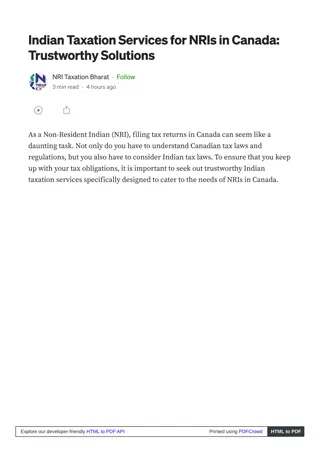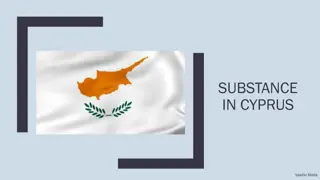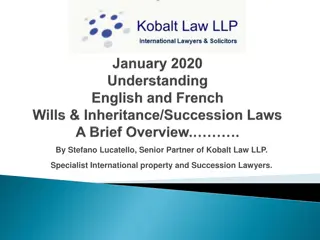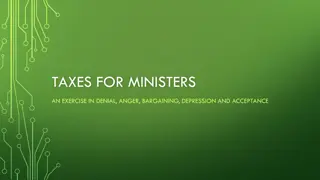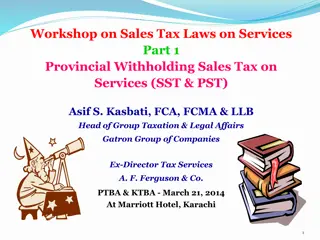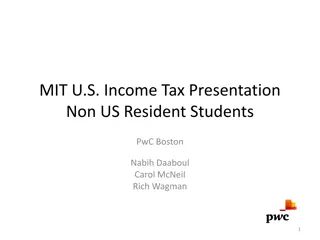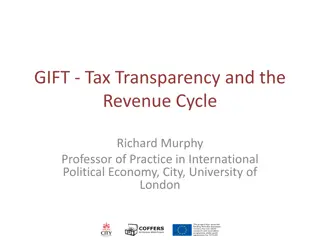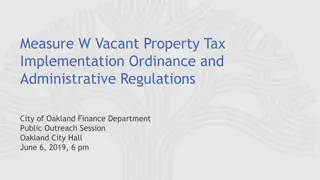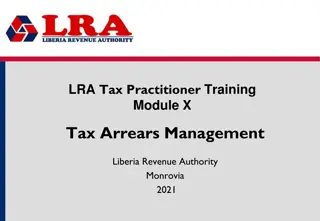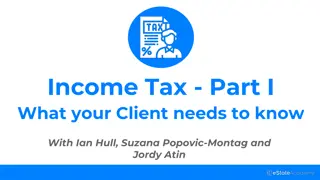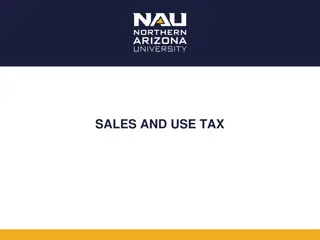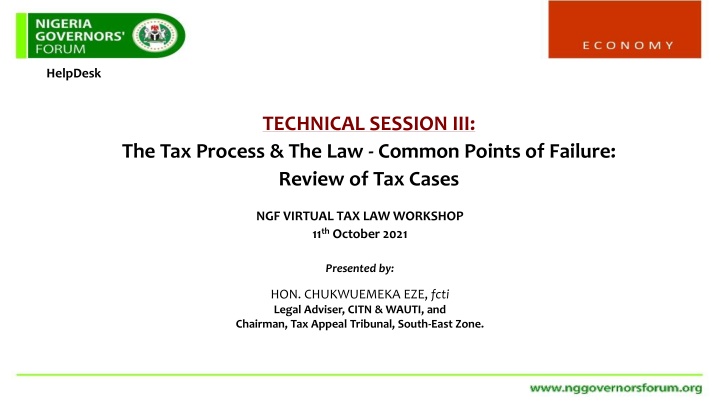
Tax Law Workshop Highlights: Common Points of Failure in Tax Cases
Explore common pitfalls in tax litigation cases highlighted at a virtual tax law workshop, including failures in charging sections, interpretation of statutes, and procedural missteps. Learn from key tax cases and recommendations to enhance tax compliance and dispute resolution strategies.
Download Presentation

Please find below an Image/Link to download the presentation.
The content on the website is provided AS IS for your information and personal use only. It may not be sold, licensed, or shared on other websites without obtaining consent from the author. If you encounter any issues during the download, it is possible that the publisher has removed the file from their server.
You are allowed to download the files provided on this website for personal or commercial use, subject to the condition that they are used lawfully. All files are the property of their respective owners.
The content on the website is provided AS IS for your information and personal use only. It may not be sold, licensed, or shared on other websites without obtaining consent from the author.
E N D
Presentation Transcript
HelpDesk TECHNICAL SESSION III: The Tax Process & The Law - Common Points of Failure: Review of Tax Cases NGF VIRTUAL TAX LAW WORKSHOP 11th October 2021 Presented by: HON. CHUKWUEMEKA EZE, fcti Legal Adviser, CITN & WAUTI, and Chairman, Tax Appeal Tribunal, South-East Zone.
HelpDesk CONTENTS Introduction The Importance of Using the Charging Section Certain cases decided by the TAT (SE Zone) to highlight process failures: o Nigeria Breweries PLC v. Abia State Board of Internal Revenue o Polaris Bank Plc v. Abia State Board of Internal Revenue o Livestock Feeds Plc v. Abia State Board of Internal Revenue o Standard Chartered Bank Nigeria Limited v. Abia State Board of Internal Revenue o First Bank Nigeria Limited v. Imo State Internal Revenue Service Understanding the Rules of Interpretation of Statutes Recommendations
HelpDesk Introduction The purpose of this presentation is to point out some of the potential failures in preparing cases which are to be litigated either as claimants or respondents and provide some guidance on how to correct, or preferably avoid, them. Certain cases decided by the TAT have been highlighted below to explain the tax process and these failures. One of the cases to be highlighted is Polaris Bank v Abia State Board of Internal Revenue, TAT/SEZ/001/2017, decided on 20th August 2019. Although, the judgement was reversed in Appeal No. FHC/UM/CS/131/19, the Appellant has already appealed the decision to the Court of Appeal. This presentation is restricted to the rationale for the decision at TAT. In the appeals summarily referred to in the presentation provided, reasons why the Revenue Service did not succeed are listed below: 1. Failure to ensure the charge on a person to tax is on a main section of a tax legislation and not on the schedule. 2. Failure can arise from charging one to tax on a secondary tax legislation. Chargeability to tax should be hinged on a primary tax legislation. 3. Failure to close settlement meetings correctly
HelpDesk Introduction 4. Failures can arise when the Revenue Service panders to form instead of substance: Know when to apply investigation and when to apply an audit, as the standard of proof of the former is beyond reasonable doubt. 5. Failure would result if processes prescribed in sections 47, 49, 58 PITA and the Court of Appeal decision in GTBANK v Ekiti State Board of Internal Revenue (2018) LPELR-46307 are not followed in obtaining third party information before considering BoJ where applicable. 6. Failure will result if a tax authority raises unsubstantiated figures for a taxpayer for PAYE entity to pay as tax liability.
HelpDesk 1. DON'T USE THE PROVISIONS IN THE SCHEDULES, NOT ROUTED IN ANY MAIN SECTION OF A TAX LEGISLATION, TO CHARGE A PERSON TO TAX. Nigeria Breweries PLC v. Abia State Board of Internal Revenue, TAT/SEZ/002/2017 delivered on 20th June 2019 where the Supreme Court decision in AC & ANOR. v. INEC (2007) LPELR-66 was cited with authority: "It has been settled principle of statutory interpretation that although schedules of a statute can be useful handmaid in construing the provisions of a statute, they cannot however be interpreted to over-rule the plain words in the body of a statute. Consequent upon this decision, the TAT held that in the absence of taxation of gratuities in the charging section, that is Section 3, of PITA, the subsequent provision in Paragraph 18(b) of the 3rd Schedule to the PITA, which allowed gratuities of value of above N100,000 to be subject to tax to be null and void since you cannot put something on nothing and expect it to stand.
HelpDesk 2. POLARIS BANK PLC V. ABIA STATE BOARD OF INTERNAL REVENUE, TAT/SEZ/001/2017 delivered on 20th August 2019 Taxes and Levies (Approved List for Collection) Act, Cap. T2, LFN 2004 is not a primary tax legislation like PITA, CITA, PPTA, etc. It has no charging section in the manner of Section 3 of PITA which is the charging section of PITA. ... In the absence of a primary legislation providing for imposition, assessment, collection and accounting of the tax or levy it has sought to collect from the Appellant, the Respondent cannot collect the tax or levy except for the Personal Income Tax or WHT, which collections have been covered by the provisions of the PITA. The fact that the Appellant had paid it in the past is not the answer - after all the Appellant has not asked for refund. "Although the Respondent titled its exercise INVESTIGATION, which connotes finding with a view to discover a tax crime, the whole exercise, the documentation and the whole evidence made it bare that it was a tax audit." Note that the Finance Act, 2019 has included gratuities as tax exempt in Paragraph 2 of the Sixth Schedule to the PITA.
HelpDesk 3. LIVESTOCK FEEDS PLC V. ABIA STATE BOARD OF INTERNAL REVENUE, TAT/ SEZ/003/2017 delivered on 21st August 2019 "By this Tribunal's decision in Polaris Bank v. Abia State Board of Internal Revenue delivered on the 20th August 2019, the Development Levy will not stand. There is no primary tax legislation of Abia State that has created and provided for the mode of collection of the Development Levy and reliance on the Taxes and Levies (Approved List for Collection) Act, Cap. T2 L.F.N., 2004 is not sufficient because it has no charging section. The Act is tax-related but it is not the primary tax legislation for collection of Development Levy in Abia State. The principle here is that tax should be chargeable through a primary tax legislation containing all the ingredients of a tax legislation.
HelpDesk 4. STANDARD CHARTERED BANK NIGERIA LIMITED V. ABIA STATE BOARD OF INTERNAL REVENUE, TAT/ SEZ/017/2015 delivered on 19th November 2019 The principle here is that there will be failure if the Revenue Service moves to circumvent the processes provided by the tax law. These processes serve as safeguards to achieving tax equity and justice. Let's go through part of our reasoning in this regard in the above appeal. "Although the Respondent has argued that the Appellant produced documents thereby contradicting its evidence, I find it important to remind the Respondent what the Personal Income Tax Act, Cap. P8, Laws of the Federation of Nigeria requires from a tax authority when it is not convinced that the taxpayer or his agent is cooperating with it. Instead of arguing back and forth with the Appellant over the disparity in the number of its staff for 2012 and 2013, the relevant tax authority can invoke its power under section 58(2) PITA to "summon any person who may be able to give information which is material to the determination of the objection to attend for examination by an officer of the relevant tax authority on oath or otherwise.
HelpDesk 4. STANDARD CHARTERED BANK NIGERIA LIMITED V. ABIA STATE BOARD OF INTERNAL REVENUE, TAT/ SEZ/017/2015 delivered on 19th November 2019 "In this context, it was open to the Respondent to summon the six staff for 2012 and six staff for 2013 to give direct information to the Respondent as to their status in the Appellant . The approach is not strange in tax administration. See Ukpong v. Commissioner for Finance & Economic Development & Anor. [1922- 2014] All Nigeria Tax Cases 153 decided on 15 December 2006. "The Respondent had the opportunity also of invoking its power under section 47 PITA which entitles it to give notice to a person to attend personally before an officer for examination with respect to any matter relating to income or gain for the purpose of obtaining full information in respect of the income or gain of a person . It was held in Egole Cosmas v. Board of Internal Revenue Vol. 2 All ATC 395 that a tax assessment authority can call for information from any source relating to the income of a taxpayer. However, this decision is circumscribed by the relevant tax statute.
HelpDesk 5. FIRST BANK NIGERIA LIMITED V. IMO STATE INTERNAL REVENUE SERVICE, TAT/SEZ/006/2019 delivered on 7th September 2021 The principle here is that a Revenue Authority is bound by any agreement it has entered into with a taxpayer and PAYE entity. Any conjuring of figures to collect tax for the same period already settled by agreement between the parties will not be allowed by the TAT. In this appeal, the parties agreed during a TARC Meeting that the Appellant should pay N395 million as full and final payment for arrears of tax liability from 1999-2017. After the payment, the Revenue Service served the Respondent a Demand Notice for the same period for the sum of N766,714,363.72. The TAT cited with approval the decision in FBIR v. Confidence Insurance (2010) 2 TLRN 96, where it was held: "Where a taxpayer and the tax authority agree as to the tax liability of the taxpayer, the taxpayer will only be liable to pay the tax as agreed."
UNDERSTANDING THE RULES OF INTERPRETATION OF STATUTES (a) "It is the law that the language of a statute imposing a tax, duty or charge must receive a strict construction in the sense that there is no room for any intendment and regard must be had to the clear meaning of the words. If the State claims a tax under a statute it must show that the tax is imposed by clear and unambiguous words, and where the statute is in doubt it must be construed in favour of the subject, however much within the spirit of the law the case might otherwise be, but a fair reasonable construction must be given to the language used without leaning to one side or the other". - Statement of the law by Lord Atkinson in Ordmond Investment Co. v. Belts [1928] AC 143 at 162, adopted: per Ikpeazu J. in Aderawos Trading Co. Ltd. v. F.B.1R [1966] L.L.R. 195 at 200. (b) "It is a general principle of fiscal legislation that to be liable to tax the subject must fall clearly within the words of the charge imposing the tax, otherwise he goes free. It is also for the State to establish that the charge prima facie extends to the subject matter sought to be charged": per Lord Halsbury L.C. in Tenant v. Smith (Surveyor of Taxes) [1892] A.C. 150 at 154, House of Lords.
UNDERSTANDING THE RULES OF INTERPRETATION OF STATUTES c) "There is a presumption that a statute says what the legislature wants, and clear evidence is needed to rebut that presumption. But at the same time, it is well settled that if a taxing law is capable of more than one interpretation, that most favourable to the taxpayer should be adopted": Shell-B.P. Petroleum Dev. Co. v. F.B.I.R. 2 FRCR (1976) 39; (1976) 1 ALR Comm. 219. d) Note that there is no equity in taxation notwithstanding that in appropriate cases, tax legislation is interpreted liberally in favour of revenue. See Ahmadu v. Governor, Kogi State (2002) 3 NWLR (Pt. 755) 502 @ 522. In First Bank v. Anambra State Internal Revenue Service, TAT/SEZ/006/2020, delivered on 13th September 2021, the TAT SEZ, by way of interpretation of the relevant provisions of the Stamp Duties Act, stated categorically that the principle of Best of Judgement assessment is statutory and since it is not in the Stamp Duties Act, it would not apply.
RECOMMENDATIONS HelpDesk (a)States should enact a primary legislation containing sections providing for the charging of Business Premises Levy and Development Levy as taxes or levies. The Law should also contain other ingredients of a primary tax legislation. (b)States should grant financial autonomy to their State Internal Revenue Services so that they can employ very qualified professionals to run the tax system. (c)States will need to patronise the Tax Appeal Tribunal for resolution of their tax disputes as the TAT have tested and experienced tax professionals that can offer interpretations of tax laws that will stand the test of time. (d)States should create digitalised tax libraries in order to assist their legal department do proper research towards success in their cases.
HelpDesk RECOMMENDATIONS e. States should ensure that the helmsmen of their Internal Revenue Service are experienced members of the Chartered Institute of Taxation of Nigeria (CITN), the sole professional body for the regulation of the tax profession in all its ramifications in Nigeria, so that they can provide the much-needed leadership that can observe processes. f. States should adopt a SUPERMARKET MODEL of tax collection where a taxpayer is treated as a customer at a supermarket instead of as a prey to be pounced upon. g. Prudent utilisation of taxpayers' money is the best antidote to voluntary tax compliance and reduction in tax disputes. It also builds stronger legitimacy for taxation. h. Lawyers working in tax offices should work harder in acquisition of general tax knowledge as many of them have no background in taxation before they found themselves by accident in the Internal Revenue Service. The legal department should be accorded training and retraining opportunities.
RECOMMENDATIONS HelpDesk THANK YOU

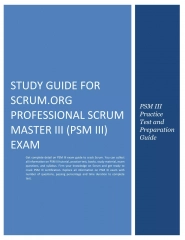

![Town of [Town Name] Real Estate Tax Rates and FY 2024 Budget Summary](/thumb/62211/town-of-town-name-real-estate-tax-rates-and-fy-2024-budget-summary.jpg)

